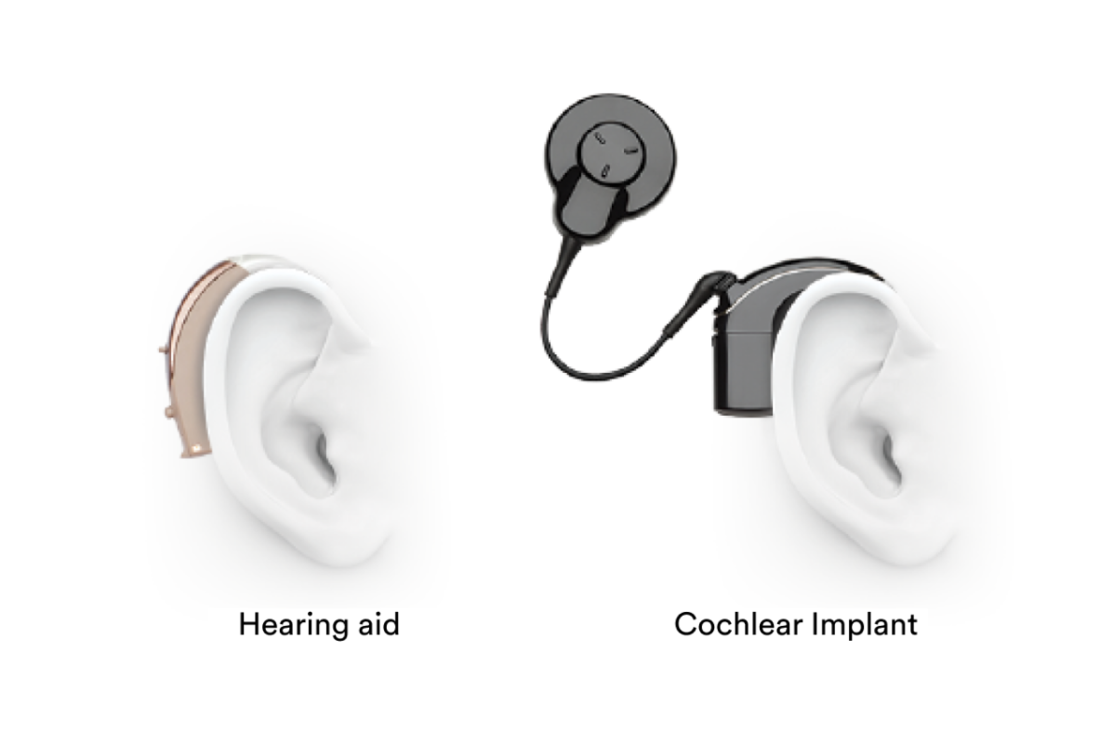
Do you qualify for a cochlear implant?
Do you qualify for a cochlear implant?
Cochlear implants work differently than hearing aids. Hearing aids help many people with hearing loss by making sounds louder. However, cochlear implants can be a more effective option for those with more significant hearing loss; specifically moderate to profound hearing loss in adults.
For some people, using a hearing aid(s) with a severe to profound hearing loss can be like listening to a loud, badly tuned radio. You may hear parts of what is being said and it may be loud enough, but the words are not clear.
Note: Wearing hearing aids first is a necessary step in the evaluation process for a cochlear implant.
Do you qualify for a cochlear implant?
Cochlear implants work differently than hearing aids. Hearing aids help many people with hearing loss by making sounds louder. However, cochlear implants can be a more effective option for those with more significant hearing loss; specifically moderate to profound hearing loss in adults.
For some people, using a hearing aid(s) with a severe to profound hearing loss can be like listening to a loud, badly tuned radio. You may hear parts of what is being said and it may be loud enough, but the words are not clear.
Note: Wearing hearing aids first is a necessary step in the evaluation process for a cochlear implant.
people to repeat
themselves?
Cochlear implants can help you connect with the world around you
Cochlear implants can help you connect with the world around you
- Cochlear implants help improve speech understanding, sound clarity and language skills3 and hearing in noise4
- Cochlear implants help improve quality of life4 and employment opportunities5
Cochlear implants can help you connect with the world around you
- Cochlear implants help improve speech understanding, sound clarity and language skills3 and hearing in noise4
- Cochlear implants help improve quality of life4 and employment opportunities5
How the Cochlear™ Nucleus® Nexa™ Implant System works
How the Cochlear™ Nucleus® Nexa™ Implant System works
Cochlear implants mimic the function of a healthy inner ear, replacing damaged sensory hair cells to provide clearer sound than hearing aids. Since sensory hair cells don't regenerate, this hearing loss requires treatment. Our implants prioritize performance and preservation of cochlear structures. Surgeons can choose from a broad range of implants and electrodes based on hearing loss type, cochlea anatomy, and preference. The Cochlear™ Nucleus® Nexa™ System consists of two main components: the external sound processor and the surgically placed implant with an electrode array inserted in the cochlea.
How the Cochlear™ Nucleus® Nexa™ Implant System works
Cochlear implants mimic the function of a healthy inner ear, replacing damaged sensory hair cells to provide clearer sound than hearing aids. Since sensory hair cells don't regenerate, this hearing loss requires treatment. Our implants prioritize performance and preservation of cochlear structures. Surgeons can choose from a broad range of implants and electrodes based on hearing loss type, cochlea anatomy, and preference. The Cochlear™ Nucleus® Nexa™ System consists of two main components: the external sound processor and the surgically placed implant with an electrode array inserted in the cochlea.
Watch the video to see how it works
Watch the video to see how it works
Watch the video to see how it works
Introducing the Nucleus® Nexa™ System
Introducing the Nucleus® Nexa™ System
The world’s first and only smart cochlear implant system.^ It’s designed to be responsive to your listening needs so you can hear with confidence, brings you into a connected ecosystem of care and support, and ready for future technology as it becomes available.
Plus it’s all backed by Cochlear’s 40+ years of proven reliability and technology leadership.
Introducing the Nucleus® Nexa™ System
The world’s first and only smart cochlear implant system.^ It’s designed to be responsive to your listening needs so you can hear with confidence, brings you into a connected ecosystem of care and support, and ready for future technology as it becomes available.
Plus it’s all backed by Cochlear’s 40+ years of proven reliability and technology leadership.
World’s smallest and lightest sound processors6,#
The Nucleus Nexa System offers you or your child two different styles of sound processors to suit your lifestyle: one that sits behind-the-ear and the other off-the-ear. Both offer comfort and discretion, Cochlear’s latest hearing technology, a growing selection of direct streaming options and a range of colors.

1.
2.
3.
Benefits of bimodal hearing
Benefits of bimodal hearing
Experience natural hearing13, better speech understanding14-16, and enhanced music perception17 with a hearing aid in one ear and a cochlear implant in the other.
Benefits of bimodal hearing
Experience natural hearing13, better speech understanding14-16, and enhanced music perception17 with a hearing aid in one ear and a cochlear implant in the other.
Mythbusters
Cochlear implant surgery is not brain surgery. The surgeon makes a small incision behind the ear, places the implant underneath the skin, delicately threads the electrodes into the cochlea and closes the incision site. In most cases, you can return home later the same day and can get back to your normal activities within a few days.
Cochlear implants have proven to be a successful solution for those who are in their 80s and even 90s. It's never too late to regain access to the sounds you're missing.
Many people believe you have to be completely deaf to get a cochlear implant. That is simply not true. In fact, you may be able to hear some sounds (like a baby crying or dog barking) even without hearing aids and still qualify for a cochlear implant. The moment you start struggling to hear and understand speech with your hearing aids in noise is the moment you should seek further evaluation by your local Hearing Implant Specialist.
A cochlear implant is designed to last a lifetime. You will be able to upgrade your sound processor as new technology becomes available while the internal components remain intact – typically no additional surgery required.
The process of getting a cochlear implant is step by step. First, start with being evaluated by a Hearing Implant Specialist to determine whether a cochlear implant may be a solution for you. From there, you will have the support you need to help you reach your hearing goals. The steps you take could make all the difference in how well you hear and participate in everyday life.
Disclaimer
Please seek advice from your health professional about treatments for hearing loss. Outcomes may vary, and your health professional will advise you about the factors which could affect your outcome. Always follow the directions for use. Not all products are available in all countries. Please contact your local Cochlear representative for product information.
For a full list of Cochlear’s trademarks, please visit our Terms of Use page.
For candidates residing in Canada, you should contact your local hearing implant center to determine coverage. The cost of a hearing implant may be covered by your provincial and territory health insurance plan. Every health insurance plan is different. Coverage varies by each province and territory, the type of hearing implant you may need and your hearing loss.
* Covered for Medicare beneficiaries who meet CMS criteria for coverage.
** Coverage for adult Medicaid recipients varies according to state-specific guidelines.
† Contact your insurance company or local Hearing Implant Specialist to determine your eligibility for coverage.
†† Coverage of hearing aids may be an option under some plans.
^ The only cochlear implant having onboard memory with upgradeable firmware. As future advancements or technology become available for the CI1000 series implant, a firmware update may be required in order to take advantage of newer features.
^^ The described feature and benefit are available for recipients with a Nucleus Nexa Implant only. Battery life varies for every user, according to the age of the battery, the programs used each day, your implant type, the thickness of skin covering your implant, and the size and type of battery used. Streaming from compatible devices, True Wireless devices or FM may decrease sound processor battery life depending on how often and for how long streaming is engaged. For Nucleus 8 Nexa and Kanso 3 Nexa sound processors, a full day of battery life is defined as 16 hours.
# The Nucleus Kanso 3 Nexa Sound Processor is the world’s smallest and lightest rechargeable off-the-ear sound processor.
¥ As Bluetooth LE Audio compatible devices become available, a firmware update will be required for you to use certain features.
‡ The Cochlear Nucleus 8 Nexa and Nucleus Kanso 3 Nexa sound processors are compatible with Apple and Android devices. The Cochlear Nucleus Smart App is available on App Store and Google Play. For compatibility information visit www.cochlear.com/compatibility
~ The Cochlear Nucleus 8 Nexa and Nucleus 8 Sound Processors with the rechargeable battery module and Kanso 3 Nexa and Kanso 3 Sound Processors meet the IP68 rating of the International Standard IEC60529 of freshwater waterproof. These processor configurations were tested by continuous submersion in freshwater for 60 minutes at a depth of 1 meter and functioned as intended. Cochlear offers the Aqua+ accessory for additional protection during extended water use, in salty or rushing water environments. For additional information, please refer to the appropriate user guide.12
References
1. Lupo JE, Biever A, Kelsall DC. Comprehensive hearing aid assessment in adults with bilateral severe-profound sensorineural hearing loss who present for Cochlear implant evaluation. Am J Otolaryngol. 2020;41(2):102300. doi:10.1016/j.amjoto.2019.102300
2. Balkany T, Hodges A, Menapace C, et al. Nucleus Freedom North American clinical trial. Otolaryngol Head Neck Surg 2007;136(5):757-762.
3. Novak MA, Firszt JB, Rotz LA, et al. Cochlear implants in infants and toddlers. Ann Otol Rhino Laryngol Suppl 2000;185:46-49.
4. Hirschfelder A, Gräbel S, Olze H. The impact of cochlear implantation on quality of life: The role of audiologic performance and variables. Otolaryngol Head Neck Surg. 2008 Mar;138(3): 357-362.
5. Wyatt JR, Niparko JK, Rothman M, deLissovoy G. Cost Utility of the Multichannel Cochlear Implant in 258 Profoundly Deaf Individuals. Laryngoscope.1996;106:816–821.
6. Cochlear Limited. D1190805 Processor Size Comparison. 2024, Feb.
7. Mauger SJ, Warren C, Knight M, Goorevich M, Nel E. Clinical evaluation of the Nucleus 6 cochlear implant system: performance improvements with SmartSound iQ. International Journey Of Audiology. 2014, Aug; 53(8):564-576. [Sponsored by Cochlear].
8. Mauger S, Jones M, Nel E, Del Dot J. Clinical outcomes with the Kanso™ o¬ -the-ear cochlear implant soundprocessor. International Journal Of Audiology. 2017, Jan 9; 1-10. [Sponsored by Cochlear].
9. Wolfe J, Neumann S, Marsh M, Schafer E, Lianos L, Gilden J, O’Neill L, Arkis P, Menapace C, Nel E, JonesM. Benets of Adaptive Signal Processing in a Commercially Available Cochlear Implant Sound Processor. Otol Neurotol. 2015 Aug;36(7):1181-90. [Sponsored by Cochlear].
10. Cochlear Limited. D1864200 SCAN-2 Design Description. 2022, Apr.
11. Cochlear Limited. D1964109 Clinical Investigation Report CLTD5804. 2022, Feb.
12. Cochlear Limited. D2105671. CP1170/CP1175 IEC60529 Ingress Protection Test Report, D1980144 CP1110 IP 68 Certificate & Test Report
13. Farinetti A, Roman S, Mancini J, et al. Quality of life in bimodal hearing users (unilateral cochlear implants and contralateral hearing aids). Eur Arch Otorhinolaryngol (2015 Nov); 272, 3209–3215.
14. Ching TY, Incerti P, Hill M. Binaural benefits for adults who use hearing aids and cochlear implants in opposite ears. Ear Hear (2004 Feb); 25, 9–21.
15. Potts LG, Skinner MW, Litovsky RA., et al. Recognition and localization of speech by adult cochlear implant recipients wearing a digital hearing aid in the nonimplanted ear (bimodal hearing). J Am Acad Audiol (2009 Jun); 20, 353–373.
16. Morera C, Cavalle L, Manrique M, et al. Contralateral hearing aid use in cochlear implanted patients: Multicenter study of bimodal benefit. Acta Otolaryngol (2012 Jun); 132, 1084–1094.
17. Sucher CM, McDermott HJ. Bimodal stimulation: benefits for music perception and sound quality. Cochlear Implants International. (2009 Jan); 1;10(S1):96-9.







